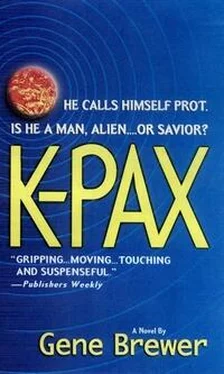Gene Brewer - K-PAX
Здесь есть возможность читать онлайн «Gene Brewer - K-PAX» весь текст электронной книги совершенно бесплатно (целиком полную версию без сокращений). В некоторых случаях можно слушать аудио, скачать через торрент в формате fb2 и присутствует краткое содержание. Жанр: Социально-психологическая фантастика, на английском языке. Описание произведения, (предисловие) а так же отзывы посетителей доступны на портале библиотеки ЛибКат.
- Название:K-PAX
- Автор:
- Жанр:
- Год:неизвестен
- ISBN:нет данных
- Рейтинг книги:4 / 5. Голосов: 1
-
Избранное:Добавить в избранное
- Отзывы:
-
Ваша оценка:
- 80
- 1
- 2
- 3
- 4
- 5
K-PAX: краткое содержание, описание и аннотация
Предлагаем к чтению аннотацию, описание, краткое содержание или предисловие (зависит от того, что написал сам автор книги «K-PAX»). Если вы не нашли необходимую информацию о книге — напишите в комментариях, мы постараемся отыскать её.
K-PAX — читать онлайн бесплатно полную книгу (весь текст) целиком
Ниже представлен текст книги, разбитый по страницам. Система сохранения места последней прочитанной страницы, позволяет с удобством читать онлайн бесплатно книгу «K-PAX», без необходимости каждый раз заново искать на чём Вы остановились. Поставьте закладку, и сможете в любой момент перейти на страницу, на которой закончили чтение.
Интервал:
Закладка:
Ernie, like, most people, is afraid of death. Unlike most of us, however, he is unable to think about anything else. He checks his pulse and temperature regularly. He insists on wearing a surgical mask and rubber gloves at all times. He is never without his stethoscope and thermometer and he showers several times a day, demanding fresh clothing after each one, rejecting anything that shows the slightest spot or stain. We humor him in this because otherwise he would wear nothing.
Eating is a serious problem for Ernie, for several . reasons. First, because of his fear of food poisoning he will not consume anything that isn't thoroughly cooked and comes to him piping hot. Second, he will only eat food that is broken or cut into tiny pieces so he won't choke to death on something too large to swallow. Finally, there is the problem of preservatives and additives. He will not eat meat or poultry, and is suspicious even of fresh fruits and vegetables.
None of this is unusual, of course, and every psychiatric hospital has an Ernie or two. What makes our Ernie different is that he raises his defenses a notch or two higher than most necrophobes. He cannot be induced to venture outside the building, for example, fearing bombardment by meteorites, cosmic rays and the like, poisoning by chemicals in the air, attack by insects and birds, infection by dustborne organisms, and so on.
But that's not all. Afraid he will unconsciously strangle himself at night he sleeps with his hands tied to his feet, and bites down on a wooden dowel so he won't swallow his tongue. For similar reasons he will not lie under sheets or blankets-he fears they might wrap themselves around his throat-and he sleeps on the floor so as not to fall out of bed and break his neck. As a sort of compensation, perhaps, he sleeps quite soundly once his ritual is complete, though he awakens early to fitfully- check his parameters and accouterments, and by the time he has breakfast is his usual nervous wreck.
How could a person get so screwed up? When Ernie was a boy of nine he watched his mother choke to death on a piece of meat. Unable to help, he was condemned to witness her last agonizing moments while his older sister ran around the kitchen, screaming. Before he could get over that horrible experience, his father dug a bomb shelter in the back yard and practiced using it. Here's how it worked: At any moment of the day or night Ernie's father would suddenly leap at him or emit a blood-curdling screech or douse him with something. That would be the signal to run for the bomb shelter. By the time he was eleven Ernie was unable to speak or to stop shaking. When he was brought to MPI it took months just to get him not to jump and run whenever a door opened or someone sneezed. That was nearly twenty years ago, and he has been here ever since. His father, incidentally, is a patient at another institution; his sister committed suicide in 1980.
Fortunately, debilitating phobias like Ernie's are rare. Those who are afraid of snakes, for example, need only stay away from forest and field. Agoraphobics and claustrophobics can usually avoid crowds and elevators and, in any case, are treatable with drugs or by slow acclimation to the offending situation. But how does one acclimate the necrophobic? How to avoid the Grim Reaper?
Howie is forty-three, though he looks to be sixty. Born into a poor Brooklyn family, his musical abilities became evident early on. His father gave him his unused violin when he was four years old and, in his early teens, he played that instrument with a number of well-respected regional orchestras. As time went on, however, he performed less and less frequently, preferring instead to study scores, other instruments, the history of music. His father, a bookseller, was not particularly concerned with this turn of events and went about his tiny shop bragging that Howie was going to become a famous conductor, another Stokowski. But by the time Howie got to college his interests seemed to cover the entire spectrum of human endeavor. He tried to master everything from algebra to Zen. He studied night and day until he finally broke down and ended up with us.
As soon as his physical health was restored, however, he was off and running again, and no tranquilizing drug has proven powerful enough to slow down his endless quest for perfection.The strain on Howie is terrible. The circles and bags under his eyes attest to his chronic battle with fatigue, and he suffers constantly from colds and other minor afflictions.
What happened to him? Why does one artist end up at Carnegie Hall and another in a mental hospital? Howie's father was a very demanding man, intolerant of mistakes. When little Howie stood up to play the violin he was terrified of making the slightest false note and offending his father, whom he loved deeply. But the better he became the more he realized how much he did not know, and how much more room for error there was than he had imagined. In order to be certain of playing his instrument perfectly he threw himself into music in all its aspects, trying to learn everything about the subject. When he realized that even this would not be sufficient, he took up other fields of study with the impossible goal of learning everything there was to know about everything.
But even that isn't enough for Howie, who spends each summer cataloging the birds and insects and counting the blades of grass on the lawn outside. In the winter he catches snowflakes, systematically recording and comparing their structures. On clear nights he scans the skies looking for anomalies, something that wasn't there before. Yet these are mere avocations for Howie. Most of the time he reads dictionaries and encyclopedias while listening to music or language tapes. Afraid he will forget something important he is constantly taking notes and making lists, then organizing and reorganizing them. Until that day in the recreation room I had never seen him when he was not frantically counting, recording, or studying. It was a struggle to get him to take time to eat.
I edged up to the table with my guest, trying to catch a bit of the conversation without scaring anyone off. From what I could gather, they were querying prot about life on K-PAX. They clammed up when they finally noticed us, however, and both Ernie and Howie scuttled away.
I introduced prot to our visitor, and took the opportunity to ask him whether he would mind submitting to a few additional tests on Wednesday, our regular meeting day. He not only didn't mind, he said, but he looked forward to it. We left him smiling broadly, apparently in eager anticipation.
ALTHOUGH we would not receive the official report from the State Board of Health for several months, the representative did point out two or three minor deficiencies that needed to be corrected, and I brought these up at the regular Monday morning staff meeting. Among the other items discussed at that meeting was the news that the search committee had narrowed down their list of possible candidates for permanent director to four-three from outside the hospital, and myself. The chair of that committee was Dr. Klaus Villers.
Villers is the kind of psychiatrist usually portrayed in films: sixtyish, pale, trim gray goatee, heavy German accent, and a strict Freudian. It was clear that he had selected the other three names personally. I was familiar with their work and each, on paper, was a reasonable facsimile of Villers himself. But all had outstanding credentials, and I was looking forward to meeting them. My own candidacy was not unexpected, but I had mixed feelings about the directorship-it would have meant permanently giving up most of my patients, among other things.
When that business was taken care of I summarized for my colleagues what I had learned so far about prot. Villers and some of the others agreed that it would be a waste of time to proceed with ordinary psychoanalysis, but thought my attempt to "humanize" him would also prove fruitless, suggesting instead some of the newer experimental drugs. Others argued that this approach was premature and, in any case, without the consent of the patient's family, the legal ramifications could become complicated. Thus, it was generally agreed that a greater effort should be made, by the police as well as myself, to determine his true identity. I thought of Meyerbeer's opera L'Africaine, in which Inez awaits the return of her long-departed lover, Vasco da Gama, and I wondered: Was there a family somewhere in this wide world fervently hoping and praying for a missing husband and father, brother or son to reappear?
Читать дальшеИнтервал:
Закладка:
Похожие книги на «K-PAX»
Представляем Вашему вниманию похожие книги на «K-PAX» списком для выбора. Мы отобрали схожую по названию и смыслу литературу в надежде предоставить читателям больше вариантов отыскать новые, интересные, ещё непрочитанные произведения.
Обсуждение, отзывы о книге «K-PAX» и просто собственные мнения читателей. Оставьте ваши комментарии, напишите, что Вы думаете о произведении, его смысле или главных героях. Укажите что конкретно понравилось, а что нет, и почему Вы так считаете.










